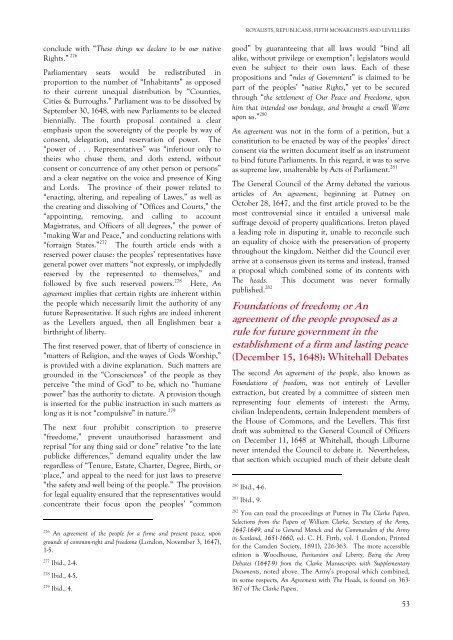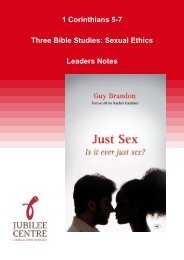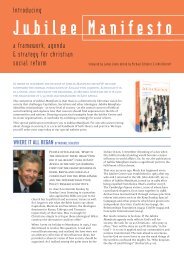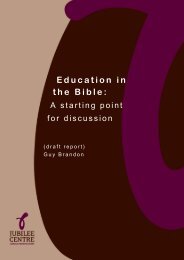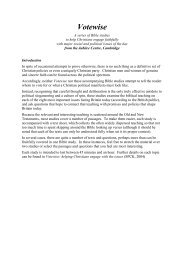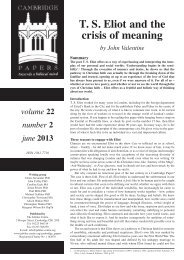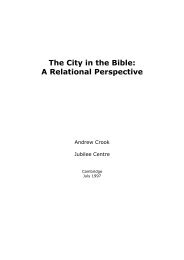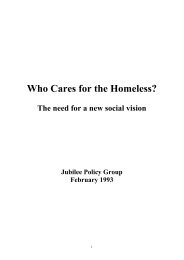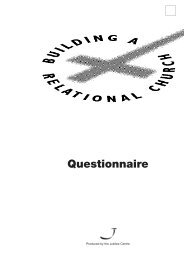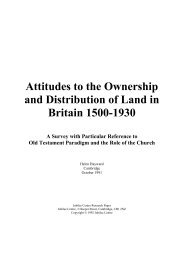Report Template - Jubilee Centre
Report Template - Jubilee Centre
Report Template - Jubilee Centre
Create successful ePaper yourself
Turn your PDF publications into a flip-book with our unique Google optimized e-Paper software.
ROYALISTS, REPUBLICANS, FIFTH MONARCHISTS AND LEVELLERS<br />
conclude with “These things we declare to be our native<br />
Rights.” 276<br />
Parliamentary seats would be redistributed in<br />
proportion to the number of “Inhabitants” as opposed<br />
to their current unequal distribution by “Counties,<br />
Cities & Burroughs.” Parliament was to be dissolved by<br />
September 30, 1648, with new Parliaments to be elected<br />
biennially. The fourth proposal contained a clear<br />
emphasis upon the sovereignty of the people by way of<br />
consent, delegation, and reservation of power. The<br />
“power of . . . Representatives” was “inferiour only to<br />
theirs who chuse them, and doth extend, without<br />
consent or concurrence of any other person or persons”<br />
and a clear negative on the voice and presence of King<br />
and Lords. The province of their power related to<br />
“enacting, altering, and repealing of Lawes,” as well as<br />
the creating and dissolving of “Offices and Courts,” the<br />
“appointing, removing, and calling to account<br />
Magistrates, and Officers of all degrees,” the power of<br />
“making War and Peace,” and conducting relations with<br />
“forraign States.” 277 The fourth article ends with a<br />
reserved power clause: the peoples’ representatives have<br />
general power over matters “not expressly, or implydedly<br />
reserved by the represented to themselves,” and<br />
followed by five such reserved powers. 278 Here, An<br />
agreement implies that certain rights are inherent within<br />
the people which necessarily limit the authority of any<br />
future Representative. If such rights are indeed inherent<br />
as the Levellers argued, then all Englishmen bear a<br />
birthright of liberty.<br />
The first reserved power, that of liberty of conscience in<br />
“matters of Religion, and the wayes of Gods Worship,”<br />
is provided with a divine explanation. Such matters are<br />
grounded in the “Consciences” of the people as they<br />
perceive “the mind of God” to be, which no “humane<br />
power” has the authority to dictate. A provision though<br />
is inserted for the public instruction in such matters as<br />
long as it is not “compulsive” in nature. 279<br />
The next four prohibit conscription to preserve<br />
“freedome,” prevent unauthorised harassment and<br />
reprisal “for any thing said or done” relative “to the late<br />
publicke differences,” demand equality under the law<br />
regardless of “Tenure, Estate, Charter, Degree, Birth, or<br />
place,” and appeal to the need for just laws to preserve<br />
“the safety and well being of the people.” The provision<br />
for legal equality ensured that the representatives would<br />
concentrate their focus upon the peoples’ “common<br />
276<br />
An agreement of the people for a firme and present peace, upon<br />
grounds of common-right and freedome (London, November 3, 1647),<br />
1-5.<br />
277<br />
Ibid., 2-4.<br />
278<br />
Ibid., 4-5.<br />
279<br />
Ibid., 4.<br />
good” by guaranteeing that all laws would “bind all<br />
alike, without privilege or exemption”; legislators would<br />
even be subject to their own laws. Each of these<br />
propositions and “rules of Government” is claimed to be<br />
part of the peoples’ “native Rights,” yet to be secured<br />
through “the settlement of Our Peace and Freedome, upon<br />
him that intended our bondage, and brought a cruell Warre<br />
upon us.” 280<br />
An agreement was not in the form of a petition, but a<br />
constitution to be enacted by way of the peoples’ direct<br />
consent via the written document itself as an instrument<br />
to bind future Parliaments. In this regard, it was to serve<br />
as supreme law, unalterable by Acts of Parliament. 281<br />
The General Council of the Army debated the various<br />
articles of An agreement, beginning at Putney on<br />
October 28, 1647, and the first article proved to be the<br />
most controversial since it entailed a universal male<br />
suffrage devoid of property qualifications. Ireton played<br />
a leading role in disputing it, unable to reconcile such<br />
an equality of choice with the preservation of property<br />
throughout the kingdom. Neither did the Council ever<br />
arrive at a consensus given its terms and instead, framed<br />
a proposal which combined some of its contents with<br />
The heads.<br />
published. 282<br />
This document was never formally<br />
Foundations of freedom; or An<br />
agreement of the people proposed as a<br />
rule for future government in the<br />
establishment of a firm and lasting peace<br />
(December 15, 1648): Whitehall Debates<br />
The second An agreement of the people, also known as<br />
Foundations of freedom, was not entirely of Leveller<br />
extraction, but created by a committee of sixteen men<br />
representing four elements of interest: the Army,<br />
civilian Independents, certain Independent members of<br />
the House of Commons, and the Levellers. This first<br />
draft was submitted to the General Council of Officers<br />
on December 11, 1648 at Whitehall, though Lilburne<br />
never intended the Council to debate it. Nevertheless,<br />
that section which occupied much of their debate dealt<br />
280<br />
Ibid., 4-6.<br />
281<br />
Ibid., 9.<br />
282<br />
You can read the proceedings at Putney in The Clarke Papers,<br />
Selections from the Papers of William Clarke, Secretary of the Army,<br />
1647-1649, and to General Monck and the Commanders of the Army<br />
in Scotland, 1651-1660, ed. C. H. Firth, vol. 1 (London, Printed<br />
for the Camden Society, 1891), 226-363. The more accessible<br />
edition is Woodhouse, Puritanism and Liberty, Being the Army<br />
Debates (1647-9) from the Clarke Manuscripts with Supplementary<br />
Documents, noted above. The Army’s proposal which combined,<br />
in some respects, An Agreement with The Heads, is found on 363-<br />
367 of The Clarke Papers.<br />
53


